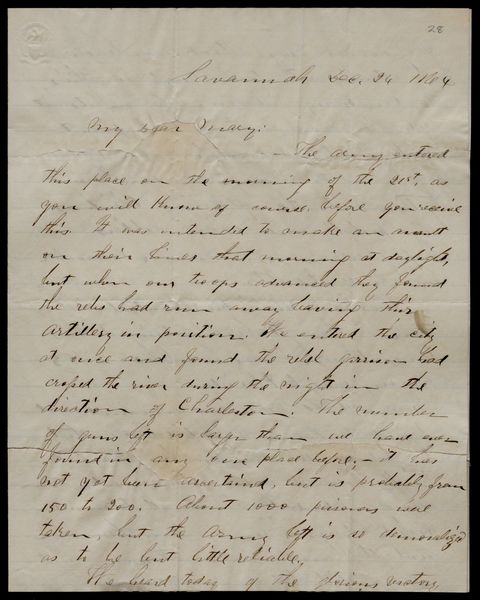Moore, John (1826-1907) to Mary Moore Kelly
High-resolution images are available to schools and libraries via subscription to American History, 1493-1943. Check to see if your school or library already has a subscription. Or click here for more information. You may also order a pdf of the image from us here.
A high-resolution version of this object is available for registered users. LOG IN
Gilder Lehrman Collection #: GLC04195.28 Author/Creator: Moore, John (1826-1907) Place Written: Savannah, Georgia Type: Autograph letter signed Date: 24 December 1864 Pagination: 4 p. ; 25.1 x 19.8 cm. Order a Copy
They arrived in Savannah ready for an assault but found the rebels had run away, leaving their artillery of a large number of guns. "The number of guns left is larger than we have ever found in any one place before; - it has not yet been ascertained, but is probably from 150 to 200. About 1000 prisoners were taken, but the Army left is so demoralized as to be but little reliable." With news of the victory near Nashville, the Confederacy may be close to ending. He mentions staying in furnished homes compared with usual outdoor lodging, but writes that "I find I can still sleep in a house, notwithstanding we have been so long out of doors."
After serving in the Utah War, Moore returned east, assigned to the Marine Hospital in Cincinnati until August 1862. As a newly promoted major, he transferred to the Army of the Potomac, assigned as medical director of the Central Grand division, where he participated in the second battle of Bull Run, Antietam, Fredericksburg, and in Chancellorsville as medical director of the 5th Corps. In June 1863 Moore became the medical director of the Department of the Tennessee, assisting in the battles of Chickamauga, Lookout Mountain, and Sherman's march on Atlanta, where he acted as medical director of the armies of Georgia, Tennessee, and Sherman's army, and was given the rank of lieutenant colonel and then colonel. Moore saw the end of the war in Missouri in St. Louis and Vicksburg.
Following the war Moore served two years at Fort Wadsworth and Fort Columbus in New York Harbor then practiced as a surgeon in the New York City area. After short stints in Europe, Virginia, Texas, Washington, and California, he was named Surgeon General in 1886. He retired in 1890 and continued living an active life in Washington, D.C. until his death in 1907.
Kelly is Moore's sister.
Citation Guidelines for Online Resources
The copyright law of the United States (title 17, United States Code) governs the making of photocopies or other reproductions of copyrighted material. Under certain conditions specified in the law, libraries and archives are authorized to furnish a photocopy or other reproduction. One of these specific conditions is that the photocopy or reproduction is not to be “used for any purpose other than private study, scholarship, or research.” If a user makes a request for, or later uses, a photocopy or reproduction for purposes in excess of “fair use,” that user may be liable for copyright infringement. This institution reserves the right to refuse to accept a copying order if, in its judgment, fulfillment of the order would involve violation of copyright law.
